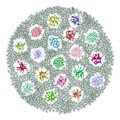It's been a very long while since I've posted here. I've been putting most of my efforts into publications that "matter" in terms of gaining tenure and academic recognition. Here is a response to an online discussion most won't see otherwise. It makes a couple points about generative art relating to formalism and intentionality worth capturing here.
---
First, it concerns me greatly when, especially in the context of generative art, there is an implicit point made that art without political content is somehow lacking, or that formal art is somehow not enough in itself, or is merely a phase to be passed though and left behind. (Not that anyone here is saying precisely that...)
I'm fond of saying that art is too important to be wasted on politics, and politics is too important to be trusted to artists. This is, of course, intentionally provocative in its glibness. But perhaps the following will add some meat.
Form matters. Form isn't just a concern for artists, it also has to do with science and philosophy and religion. Artists in the modern period made would-be heroic claims to privileged understanding of form as expressions of their inner psyche and the channeling of primordial forces. Artists in the postmodern period in the process of rejecting the claims to privilege and high art, a claim also attacked in part by the identity politics promoted in postmodern critical studies, rejected formalism. Beauty came to be thought of as, at best, a naive and useless notion, and at worst a destructive tool of ideology and political oppression.
Generative art, and especially generative art that harnesses what we are learning from complexity science, is a unique opportunity to rehabilitate formalism in art. It presents form as anything but arbitrary. It presents beauty as the result of an understandable universe neutral to human social construction in a fair and unbiased way.
Formalism in art can now be thought of as neither a claim to privilege nor meaningless beauty. Form can be appreciated as a real, meaningful, publicly understandable process available to all. Relative to the postmodern era, tired and played out, this new conception of form is revolutionary and well worth exploration in its own right.
Second point, regarding the claim that "generative processes are used to negate intentionality."
They certainly can be, but they also certainly don't have to be. A trivial example would be generative techniques used in Hollywood animated filmmaking. They might, for example, use L-systems and so on to create a forest scene. There is no negation of intentionality. The art director gets the look he or she wants. It's a purely pragmatic decision.
Frankly I see the term "generative art" as having very little content. It's a starting point in that it is a name for a subset of art made in a certain way. But it says nothing about that art in terms of content, meaning, value, criticism (other than categorization), and so on.
It's a lot like the term "painting." Painting refers to work made by applying pigment to a surface. But any statement like "painting is about revealing the soul" or "painting is about mimesis" or whatever is bound to be wrong. Wrong because painting can be about these things, but also so much more.
The one thing all generative art does has in common, by definition, is the use of generative systems. That's why in my take on it the next step is to ask "what can we say about systems?" I try to put that question in the context of complexity science because I view that as the current best universal take on systems. And indeed it yields a way to sort out subsets of generative art, and it turns out those subsets came into practice in a historical order.
But beyond that I find statements that generative art is this or that wrong in that they are overly exclusionary. What *could* be said is something like "at this point in art history the most useful generative art addresses the issue of intentionality." That would be a debatable point, but it doesn't deny the category of "generative art" to art that really should be included.
Personally I am not very interested in the issues around intentionality, and I'm very much less interested in the intersection of art and politics. What is interesting to me is how complex generative systems give us a way to explore the very nature of the universe.
Monday, January 2, 2012
Subscribe to:
Comments (Atom)
